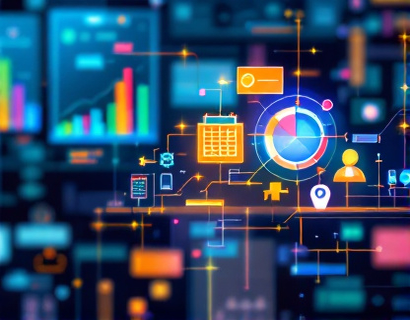Transforming Educational Landscapes: The Role of AI-Driven Learning Platforms in Safe Student Exploration and Expert Knowledge Access
The integration of Artificial Intelligence in educational technology has ushered in a new era of learning, where platforms are not only delivering content but also facilitating personalized, safe, and expert-driven educational experiences. This article delves into the specialized insights of AI-driven learning platforms, focusing on how these systems integrate services to ensure a secure and informative experience for students and educators. The emphasis is on the innovative approaches these platforms employ to verify content accuracy and safety, making them invaluable resources for educational institutions and learners.
AI-Powered Educational Chat Platforms: A New Paradigm in Learning
AI-powered educational chat platforms represent a significant leap forward in educational technology. These platforms leverage advanced algorithms and natural language processing to deliver expert insights on a wide range of topics, including integration services and industry knowledge. By providing a chat interface, these platforms offer an interactive and engaging way for users to access specialized information, fostering a deeper understanding of complex subjects.
The core advantage of these platforms lies in their ability to deliver real-time, context-specific information. For instance, a student exploring integration services can receive immediate answers to their queries, guided by expert knowledge. This not only enhances the learning experience but also ensures that the information is up-to-date and relevant, a challenge traditional educational resources often struggle with.
Ensuring Content Accuracy and Safety
One of the most critical aspects of AI-driven learning platforms is the verification of content for accuracy and safety. Educational institutions and parents are increasingly concerned about the reliability of online resources, especially when it comes to children and students. To address this, these platforms employ rigorous content verification processes, involving expert reviewers and automated fact-checking mechanisms.
Content verification ensures that the information provided is not only accurate but also appropriate for the intended audience. For example, platforms designed for younger users include child-friendly versions of content, filtering out complex jargon and ensuring the language is accessible and safe. This dual focus on accuracy and safety makes these platforms trustworthy resources for educational exploration.
Expert Knowledge Access: A Gateway to Industry Insights
Access to expert knowledge is a cornerstone of these AI-driven platforms. By connecting students and educators with industry experts, these platforms bridge the gap between theoretical learning and practical application. The chat interface serves as a conduit for real-time interactions, allowing users to ask questions, seek clarifications, and gain insights from professionals in the field.
These interactions are not just limited to answering questions; they often involve guided discussions and personalized learning paths. For instance, a student interested in software integration can engage in a conversation that starts with basic concepts and gradually delves into more advanced topics, based on their responses and interests. This adaptive approach ensures that the learning experience is tailored to each user's needs and pace.
Integration Services: A Focused Area of Expertise
Integration services, which involve connecting different software systems to enable seamless data exchange and functionality, are a critical area where these platforms excel. By providing specialized insights into integration services, these platforms help students and educators understand the complexities and benefits of system integration.
For example, a user exploring API integrations can receive detailed explanations of how APIs work, their importance in modern software development, and best practices for implementation. The platform can also offer case studies and real-world examples, making the learning experience more engaging and practical. This level of detail and context is invaluable for students looking to build a strong foundation in IT and software development.
Enhancing Educational Experiences Through Personalization
Personalization is a key feature of AI-driven learning platforms. By analyzing user interactions and learning patterns, these platforms can tailor content and recommendations to individual needs. This personalized approach not only enhances the learning experience but also increases user engagement and satisfaction.
For instance, a student who frequently asks about cloud integration services might receive additional resources and exercises focused on cloud technologies. This adaptive learning environment ensures that users are continually challenged and supported, promoting a deeper and more comprehensive understanding of the subject matter.
Creating a Secure Learning Environment
Security is paramount in educational technology, especially when dealing with sensitive information and young users. AI-driven learning platforms implement robust security measures to protect user data and ensure a safe online environment. This includes encryption, secure authentication protocols, and regular security audits.
Moreover, these platforms adhere to strict privacy policies, ensuring that user data is handled with the utmost care. For educational institutions, this provides peace of mind, knowing that the technology they adopt complies with regulatory standards and best practices in data protection.
Facilitating Collaborative Learning
Beyond individual learning, AI-driven platforms also facilitate collaborative learning experiences. The chat interface enables students and educators to engage in group discussions, share resources, and collaborate on projects in real-time. This collaborative aspect is crucial in today's educational landscape, where teamwork and communication skills are highly valued.
For example, a group of students working on a project related to integration services can use the platform to discuss ideas, share research, and coordinate tasks. The platform can even provide tools for managing group projects, such as task assignments and progress tracking, further enhancing the collaborative experience.
Supporting Diverse Learning Needs
AI-driven learning platforms are designed to support a wide range of learning needs and styles. For students with special educational requirements, these platforms can offer customized content and interactive elements that cater to their specific needs. This inclusivity ensures that all students have equal access to high-quality educational resources.
Additionally, the platforms can adapt to different learning paces and styles, providing visual, auditory, and interactive content to accommodate various preferences. This flexibility is essential in creating an inclusive learning environment that promotes equity and accessibility.
Continuous Improvement and Innovation
The field of educational technology is rapidly evolving, and AI-driven learning platforms are at the forefront of this innovation. These platforms continuously update their algorithms and content based on user feedback and emerging trends in education and technology. This commitment to improvement ensures that the platforms remain relevant and effective in meeting the changing needs of students and educators.
For instance, the integration of new AI techniques, such as machine learning and natural language understanding, enhances the platform's ability to provide accurate and contextually relevant information. This ongoing innovation not only improves the user experience but also pushes the boundaries of what is possible in educational technology.
Conclusion: The Future of Educational Learning
AI-driven learning platforms represent a transformative force in education, offering safe, accurate, and personalized learning experiences. By integrating expert knowledge and specialized insights through advanced chat interfaces, these platforms are redefining how students and educators access and engage with educational content. As technology continues to evolve, the potential for these platforms to enhance learning and drive educational excellence is immense.
In conclusion, the future of educational learning is increasingly intertwined with AI and educational technology. These platforms not only provide valuable resources and insights but also create a secure and supportive environment for exploration and growth. As we move forward, the role of AI in education will only become more significant, shaping the way we learn and interact with knowledge.











































